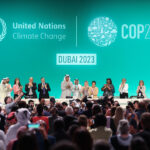Posts tagged with 'subnational action'
Every three years, ICLEI hosts the ICLEI World Congress to showcase how subnational actors advance sustainable urban development worldwide. The most recent installment, ICLEI World Congress 2024, held June 18-21 in São Paulo, Brazil, converged over 1,500 global attendees to ...

In March 2024, the inaugural Buildings and Climate Global Forum convened more than 1,000 participants to spur action towards built environment decarbonization and resilience. The first-of-its-kind forum was welcome, as the sector needs a shakeup. The big issue on the table was ...

“What you do in your cities resonates across the world. When you make your cities green and sustainable, you are not just local heroes, you are global heroes.” Those were the inspiring words that Inger Anderson, Director of the UN ...

By early 2025, countries are due to unveil new national climate commitments under the Paris Agreement, known as nationally determined contributions (NDCs). These commitments form the foundation of international climate action, establishing emissions-reduction targets and other measures that countries promise ...

At the 43rd session of the Intergovernmental Panel on Climate Change (IPCC) in Nairobi, Kenya, in 2016, the Panel decided to include a Special Report on Climate Change and Cities in the IPCC’s seventh assessment cycle. This achievement marked a ...

By David Waskow, Jennifer Layke, Nate Warszawski, Preety Bhandari, Gabrielle Swaby, Natalia Alayza, Jamal Srouji, Mario Julien Díaz, Edward Davey, Rogier van den Berg, Roman Czebiniak, Paige Langer and Nathan Cogswell on December 19, 2023
The COP28 climate talks began with a new fund to address the increasingly severe losses and damage vulnerable countries face from climate impacts and concluded with the first international agreement to tackle climate change’s main driver: fossil fuels. Those bookends to the Dubai summit ...

With recognition of the vital role of both subnational and national governments in the climate agenda, the G7 Roundtable on Subnational Climate Actions was established by the G7 Climate, Energy and Environment Ministers Meeting in 2023 under the presidency of Japan. The ...

To date, over 90 countries have set net-zero emissions targets, committing to help prevent the most harmful impacts from climate change. But questions remain around the credibility of many of these pledges and whether these goals will be met. Together, countries with net-zero targets — which ...

To cut transport emissions, moving vehicles away from burning fossil fuels is a fundamental step. However, the e-mobility transition is not only an opportunity to reduce emissions but to modernize mobility across the board, from expanding access to public transport ...

China’s transport CO2 emissions accounted for 11% of the world’s transport greenhouse gas (GHG) emissions, following only the United States (21%), according to data from Climate Watch. And these numbers have been growing rapidly: The average annual growth rate of China’s transport ...

We now have less than seven years to cut emissions in half in order to keep global warming below 1.5 degrees C, the limit scientists say is necessary for averting some of the most dangerous climate impacts. 2022 saw flooding, drought and severe ...

Cities have never been more engaged on climate action. At the 2021 UN Climate Change Conference (COP26), more than 1,100 cities representing a quarter of global CO2 emissions signed up to the Cities Race to Zero. In doing so, they committed ...

While building construction and operations are among the largest contributors to climate change, accounting for nearly 40% of energy-related CO2 emissions globally, they also remain the most cost-effective climate mitigation solution available. Every $1 invested in efficiency saves $2 in ...

In cities around the world, local officials face multi-dimensional sustainability and resilience challenges and are often responsible for achieving many overlapping mandates. More effective solutions require cross-cutting responses and collaboration across multiple levels of government and sectors. New research reveals ...

Cities are a core driver of climate change, accounting for more than 70% of greenhouse gas emissions. Precisely because they are such big GHG emitters, cities can be at the forefront in tackling climate change by leading the switch to clean energy. ...


























